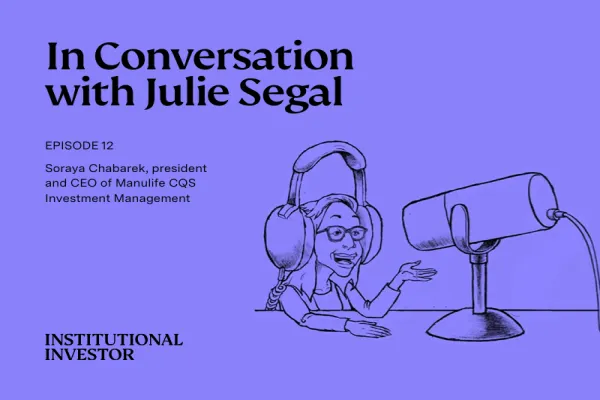Institutional Investor is pleased to announce the finalists for the fifth annual Allocators’ Choice Awards.
II selected the finalists based on a pool of nominations submitted in May and June, as well as reporting completed by editorial team members during that time period. Asset allocators can now submit their votes for the winners, who will be crowned on September 13 at an awards dinner at the Mandarin Oriental in New York City. During the ceremony, II will also honor Exelon Corp. senior vice president and chief investment officer Doug Brown with a Lifetime Achievement Award.
In-house investment staff members of pension funds, endowments, foundations, sovereign wealth funds, and family offices worldwide can vote online for their peers. To submit a ballot, please use this link. Voting closes on August 12.
Here are details on the categories and past winners. Allocators, request an invite to the dinner here.
Advocate of the Year
Harvard Management Company (Rick Slocum, CIO), for deploying an unusual approach to environmental, social, and governance investing: using short-selling positions.David Holmgren, CIO at Hartford HealthCare, and David Erickson, CIO at Ascension Investment Management, for offering young staffers opportunities to meet with managers and speak on panels as they work to build the next generation of allocator talent.
Kresge Foundation (Robert Manilla, former CIO and John Barker, current CIO), for supporting LGBTQ+ team members and investment managers. Kresge is one of the first asset owners to join Out Investors, which it did after an investment team member asked to do so.
Elizabeth McGeveran, director of investments at the McKnight Foundation, for her work on making the McKnight Foundation a mission-aligned investment organization. Forty percent of the foundation’s portfolio is invested in mission-aligned assets, and McGeveran is working to implement its net-zero pledge.
Andrew Palmer, CIO at Maryland State Retirement and Pension System, for his advocacy for best-in-class performance and standards. Palmer is a co-chair of AIF Global’s investor board.
Rob Rahbari, senior investment officer and assistant treasurer at the University of Rochester, for his work on Institutional Allocators for Diversity Equity & Inclusion, which connects allocators and diverse managers and shares best practices along the way. His co-founders include Stephanie Westen, investment operations analyst at the University of Rochester; Bhakti Mirchandani, managing director, responsible investing at Trinity Church Wall Street; and Sophia Tsai, managing director at Trinity Church Wall Street.
Innovator of the Year
Employees Retirement System of Texas (Panayiotis Lambropoulos, portfolio manager), for the Launchpad Program, an early-stage hedge fund seeding partnership with PAAMCO. This year, ERS upsized the program and it committed capital to Lijaro Asset Management.Los Angeles County Employees Retirement Association (Jonathan Grabel, CIO), for using co-investments, co-leading secondaries investments, and working closely with asset managers to control the timing of investments and reduce costs.
MacArthur Foundation (Susan Manske, vice president and CIO), for the organization’s “super innovative” hedge fund program, which overlays derivatives on top of traditional investments. “No one else does it the way she does it,” according to a nominator.
Sorenson Impact Foundation (Jim Sorenson, chair), for a seeding program that supports new impact funds, with a special focus on diverse founders.
Washington University Investment Management Company (Scott Wilson, CIO), for running a concentrated portfolio that includes cryptocurrency and frontier markets exposure.
Wespath Benefits and Investments (Dave Zellner, CIO), for its LifeStage Retirement Income Program, which helps plan participants optimize their income in retirement, ensuring that they don’t spend too much or too little.
Investment Committee/Board of the Year
California State Teachers’ Retirement System (Harry Keiley, chair), for overseeing a year of strong performance and the continued implementation of the Collaborative Model.Ford Foundation (Francisco Cigarroa, chair), for its longtime commitment to mission-related investments, including a 2021 announcement that moving forward, the foundation would no longer invest in any fossil-fuel-related industries.
Indiana Public Retirement System (Bret Swanson, chair), for what a nominator described as “boldly” lowering the pension fund’s return assumption to 6.25 percent, after a year of strong performance.
MIO Partners, for building a new board, hiring Basil Williams as chief executive officer, and weathering a compliance fine from the Securities and Exchange Commission.
Rockefeller University (William Ford, chair), for bringing in top performer Paula Volent after losing accomplished chief investment officer Amy Falls to Northwestern University.
Washington University Investment Management Company (Eric Upin, chair), for having “best practices top to bottom” that help retain staffers and encourage them to make innovative investments, according to a nominator. The board shares those practices with other institutions.
Williams College (Timothy Barrows, chair), for its “significant” partnership with CIO Collette Chilton and treating the school’s alumni base as an asset.
Partnership of the Year
Lighthouse Palmetto (The South Carolina Retirement System Investment Commission and Lighthouse Investment Partners), for a longtime partnership that provides RSIC access to niche strategies and tactical opportunities. RSIC recently shifted several billion dollars to hedge funds, aided by Lighthouse.MIT Sloan Sustainability Initiative’s Aggregate Confusion Project (Massachusetts Institute of Technology, Massachusetts Pension Reserves Investment Management Board, MFS Investment Management, AQR Capital Management, and Asset Management One), for working to “reduce the level of noise in ESG measurement,” by improving data available to managers and allocators.
Public Sector Pension Investment Board (PSP Investments) and Citri&Co, for setting up a longtime strategic alliance to acquire and manage agricultural land. The farmland is primarily citrus fields in Spain, which Citri&Co will continue to operate as the two seek opportunities for acquisitions.
The State of Wisconsin Investment Board and LibreMax Capital, for a multi-year partnership across several different asset classes, including general partner ownership.
University of California Office of the Chief Investment Officer (UC Investments) and Napier Park Global Capital, for a CLO investment strategy that UC seeded — a deal that ended up being “extremely profitable,” with First Eagle Investments acquiring Napier Park in March.
Team of the Year
Carnegie Corporation of New York (Mark Baumgartner, CIO), for “exceptional investing,” innovative thinking, collaboration with peers, and fostering a “strong, honest, and respectful culture,” according to a nominator.DUMAC (Neal Triplett, CIO), for posting meaningful returns in 2021 thanks to a talented group of 55 staffers. One nominator specifically heralded the organization’s strong venture capital team.
Hackensack Meridian Health (Donna Snider, CIO), which built a talented investment team from scratch after HMH decided to bring its investment management practice in-house.
San Bernardino County Employees’ Retirement Association (Donald Pierce, CIO), for its team-focused, consensus-based approach to evaluating co-investments. The CIO and investment team are known among managers for asking “penetrating and interesting questions.”
The University of Texas/Texas A&M Investment Management Company (Rich Hall, CIO), for the seamless execution of its succession plan, allowing CEO and president Britt Harris to focus on big picture, long-term strategy while newly-minted CIO Rich Hall focuses on investing.
UPS Investments (Ernie Caballero, CIO), for a strong crop of rising stars who work alongside seasoned investors. Several nominators say this group of kind individuals deserves recognition.
Wellcome Trust (Nick Moakes, CIO), a United Kingdom-based foundation that is known for its team members’ intelligence, which shows in how they approach endowment investing.
Turnaround of the Year
Berkeley Endowment Management Company (David McAuliffe, president and CIO), for increasing diversification and improving performance, leading the organization to become the top-performing endowment in the UC system. The entire team has joined in the past five years, although the endowment was established in 2009.Houston Firefighters Relief and Retirement Fund (Ajit Singh, CIO), for significantly improved performance during Singh’s six-year tenure. HFRRF is focused on making concentrated investments with top-tier managers. The organization was one of the first public pension funds to allocate directly to cryptocurrency.
Vanderbilt University (Anders Hall, vice chancellor for investments and CIO), after returning 57 percent in 2021 and posting a 16 percent five-year average annual return. Hall joined in 2013, and has since moved capital into innovative, high-performing strategies.
CIO of the Year
Jane Dietze, Brown University, for her impressive five- and ten-year returns. Dietze places a special focus on technology investing, including sitting on Galaxy Digital’s board, as one example. She is willing to invest in early-stage funds and to do direct and co-investments.Bob Jacksha, the New Mexico Educational Retirement Board, for making the most of the resources available to his fund “through ruthless, but carefully constructed diversification.” Jacksha seeks out managers and strategies that are too small for larger plans to invest in, including mitigation banking, music royalties, and water.
Meredith Jenkins, Trinity Church Wall Street, for building the church’s first in-house investment team over the past six years. Jenkins spent five years investing alongside Kim Lew at Carnegie Corp. as co-CIO before departing to build the investment office.
Letitia Johnson, Amherst College, for helping the organization post its best-ever year of performance in 2021. Johnson was able to post a 52.2 percent annual return just two years after joining.
Thomas Lenehan, Wallace Foundation, for fostering strong relationships with the investment committee, recruiting “an excellent team,” and increasing the organization’s private portfolio from 20 percent to 30 percent — securing investments with managers on Wallace’s wish list along the way.
Bryan Lewis, United States Steel Corporation, for reversing an outsourced chief investment officer model to in-house management over the course of four months. Under his watch, funded status has increased, allowing the organization to complete a partial pension risk transfer.
Stuart Mason, University of Minnesota, who a nominator described as being not only one of the kindest people in endowment management, but a superb investor, delivering “amazing” ten-year performance for the university’s small portfolio.
Tim Recker, the James Irvine Foundation, for posting strong returns with a highly concentrated portfolio of managers that includes a large allocation to venture capital. The foundation’s size and governance structure has allowed Recker to pursue smaller managers.
Karl Scheer, University of Cincinnati, for his work to foster community among the Big Ten CIOs, his strong belief in the university’s mission, and his willingness to be transparent with colleagues and peers. “He is honest in his comments and sets a tone with his team and peer colleagues to embrace respectable honest debate,” according to his nominator.
Anastasia Titarchuk, New York State Common Retirement Fund, for growing and developing her team through the pandemic while creating a $3 billion strategic partnership program in the public markets. Titarchuk is a “leader in sustainable investing” who has managed NYS’s push toward divestment well, according to a nominator.







